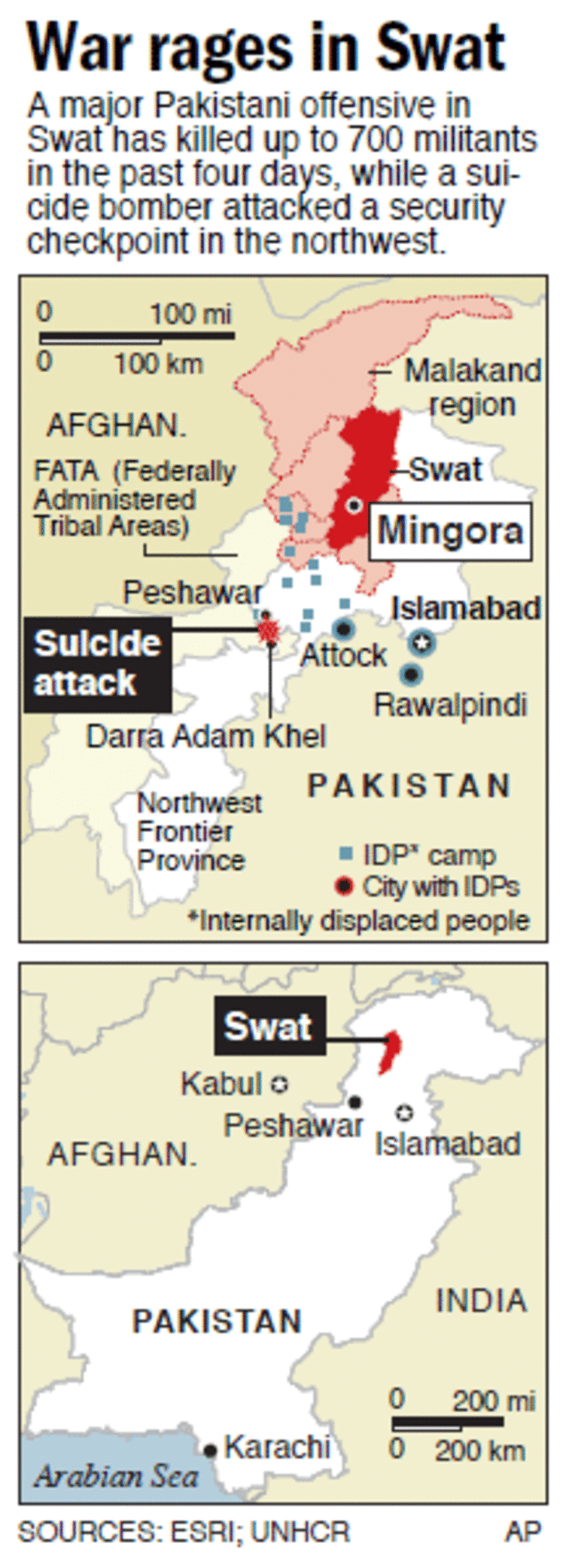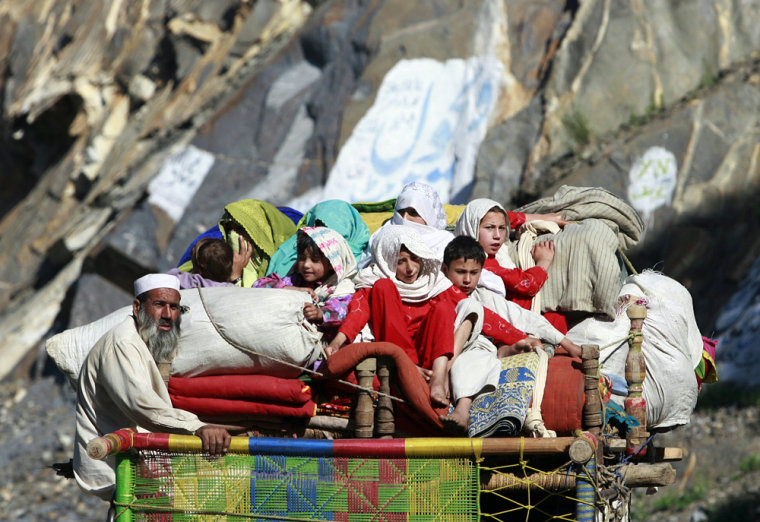Men lined up in the baking sun and children held empty food bowls as hundreds of thousands of Pakistanis fled the battle between the army and the Taliban, raising the risk Monday that public support could turn against an offensive Washington sees as a must-win battle.
The U.S. announced $4.9 million worth of aid for the refugees, many of whom arrived in the parched camps empty-handed and questioning how they would survive.
"It's hell for us," said Zaida Bibi, 20, as she glanced around her new accommodations, a mostly bare tent in the Mardan area, its floor covered by a thin tarpaulin that proved little cushion against the rugged earth.
At least 360,000 Pakistanis displaced by recent fighting have registered in camps and other centers since early May, the U.N. said. That's on top of some 500,000 people displaced by offensives that date to August 2008 — though it's unclear how many of those remain refugees.
Most of the newly displaced are expected to stay with relatives or friends. But some 30,000 are settling into U.N. camps, spokeswoman Ariane Rummery said. The agency announced Monday it will airlift 120 tons of relief supplies to help refugees in the region.
Warplanes bomb suspected positions
The U.N. is working in at least five camps with the new refugees, though the government has established several sites elsewhere. The figures could rise if fighting proceeds.
The military operation is focused in the Swat Valley, a major Taliban stronghold, and surrounding districts. Pakistani warplanes bombed suspected insurgent positions in the area Monday, while the government claimed it had killed up to 700 Taliban in four days of fighting.
Islamabad's tough military response has earned praise from the U.S., which wants al-Qaida and Taliban militants routed from havens where they can plan attacks on American and NATO forces in nearby Afghanistan. It has also earned broad support from Pakistanis, including many in the region who fled after enduring Taliban brutality for the past two years.
Still, the newly displaced are desperate for a quick finish to the offensive, and they worry about what will be left of their homes.
Swat, with 1.5 million residents, was once a tourist haven dubbed the "Switzerland of Pakistan" for its Alpine scenery. It lies less than 100 miles from the capital, Islamabad, and not far from the Afghan border.
It's also near the lawless Pakistani tribal areas, where al-Qaida and the Taliban have strongholds and where the U.S. says al-Qaida chief Osama bin Laden may be hiding.
"We cannot go back if there is a fight and our houses are destroyed," said Meraj Bibi, 50, who comes from Swat's main town of Mingora. "We love our land. It is so beautiful."
Refugees lined up for hours to register for aid Monday.
Mardan camp is near graveyard
As the heat bore down, there was little relief beyond hand-held fans. At a camp in Mardan, which sprung up near a graveyard on land designated for a new housing development, children scampered throughout the area. But instead of houses, there were hundreds of white tents stretching into the distance.

Pakistani Prime Minister Yousuf Raza Gilani said the government, which had urged residents to leave the region to avoid casualties, was devoting millions of dollars to help the refugees.
"These people have left their areas to save the country — we appreciate their sacrifices," Gilani said. "The nation is ready to provide them all required facilities."
But Pakistani political analyst Mehdi Hasan said the government must act quickly.
"If the disappointment of the people and the resentment of displaced persons increases, then it will be difficult for the government to continue this military action," he said.
At a Mardan camp where some 12,000 people had already settled, Naheed Amir, a health worker with the aid group Ummah Welfare Trust, said she was seeing more than 300 patients a day with a range of illnesses from diarrhea to eye infections.
"The situation is for now under control," she said, sitting behind a table covered in medicine and vitamin bottles. "I'm afraid difficulties may arise because of a lack of hygiene."
Some of the displaced families said they'd had nothing to eat but lentils over the past few days, and that they needed electricity, more water and better relief from the heat.
Many of those who fled went well beyond the northwest, traveling as far as the southern city of Karachi.
"We are now displaced and homeless and we are a burden on our relatives here in Karachi," said Shah Hussain, who fled Buner, a region next to Swat that also has faced bombing. "They are already poor, but it's our staunch traditions which gives our hosts the strength to take care of us in whatever way they can."
Thousands of soldiers, extremists
The military launched the most recent offensive after the insurgents in Swat used a peace deal to impose their reign in other neighboring areas, including a stretch just 60 miles from the capital.
The army says 12,000 to 15,000 troops in Swat face 4,000 to 5,000 militants, including small numbers of foreigners and hardened fighters from the South Waziristan tribal region.
Interior Minister Rehman Malik said 700 militants had been killed around Swat in the last four days. The toll, which exceeds those given by the military Sunday, could not be independently verified because access to the battlefields has been restricted.
The government has not released figures for civilian casualties, but accounts from refugees suggest they are significant.
Giliani said the army had cleared Mingora of mines planted by the insurgents.
"We haven't given them a chance. They are on the run," Malik said. "They were not expecting such an offensive."
Elsewhere in Pakistan's northwest, police say a suicide bomber exploded his vehicle at a checkpoint, killing six civilians and two members of the Frontier Constabulary security force.
